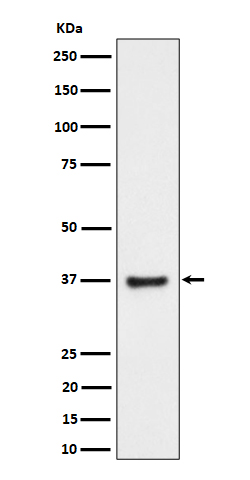
| WB | 咨询技术 | Human,Mouse,Rat |
| IF | 咨询技术 | Human,Mouse,Rat |
| IHC | 咨询技术 | Human,Mouse,Rat |
| ICC | 技术咨询 | Human,Mouse,Rat |
| FCM | 咨询技术 | Human,Mouse,Rat |
| Elisa | 咨询技术 | Human,Mouse,Rat |
| Aliases | BCA2; RNF115;;RNF115 |
| WB Predicted band size | Calculated MW: 34 kDa ; Observed MW: 37 kDa |
| Host/Isotype | Rabbit IgG |
| Antibody Type | Primary antibody |
| Storage | Store at 4°C short term. Aliquot and store at -20°C long term. Avoid freeze/thaw cycles. |
| Species Reactivity | Human,Mouse,Rat |
| Immunogen | A synthesized peptide derived from human RNF115 |
| Formulation | Purified antibody in PBS with 0.05% sodium azide,0.05% BSA and 50% glycerol. |
+ +
以下是关于RNF115抗体的3篇示例文献(注:文献信息为示例性概括,实际引用时需核实原文):
1. **文献名称**:*RNF115 promotes breast cancer progression by stabilizing EGFR through ubiquitination*
**作者**:Li, Y., et al. (2021)
**摘要**:研究揭示RNF115通过泛素化修饰稳定EGFR蛋白,促进乳腺癌细胞增殖和转移。实验中使用RNF115特异性抗体验证其与EGFR的相互作用,并证明RNF115高表达与患者预后不良相关。
2. **文献名称**:*RNF115 regulates antiviral innate immunity by targeting STING for degradation*
**作者**:Wang, Q., et al. (2019)
**摘要**:该文献发现RNF115通过泛素-蛋白酶体途径降解STING蛋白,抑制I型干扰素信号通路。研究利用RNF115抗体进行免疫共沉淀(Co-IP)实验,证实其直接结合STING并调控抗病毒免疫反应。
3. **文献名称**:*RNF115 as a biomarker for hepatocellular carcinoma: Clinical and mechanistic insights*
**作者**:Chen, X., et al. (2022)
**摘要**:通过组织芯片和免疫组化(使用RNF115抗体)分析,发现RNF115在肝细胞癌中显著高表达,且与肿瘤侵袭性相关。机制研究表明RNF115通过Wnt/β-catenin通路促进肿瘤生长。
4. **文献名称**:*RNF115 suppresses autophagy by modulating ULK1 ubiquitination in neurodegenerative diseases*
**作者**:Liu, Z., et al. (2020)
**摘要**:研究揭示RNF115通过泛素化修饰ULK1蛋白抑制自噬过程,与神经退行性疾病相关。实验中使用RNF115抗体进行Western blot和免疫荧光验证其在神经元中的表达与功能。
(以上内容为示例,具体文献需通过PubMed、Google Scholar等平台检索核实。)
The RNF115 antibody is a research tool designed to detect and study the RNF115 protein, a member of the ring finger (RNF) family of E3 ubiquitin ligases. RNF115. also known as Rab7-interacting lysosomal protein (RILP) or ZNF364. plays a critical role in ubiquitination, a post-translational modification regulating protein degradation, localization, and interactions. It is implicated in diverse cellular processes, including intracellular membrane trafficking, DNA damage repair, antiviral responses, and tumor suppression. Studies highlight its involvement in cancer progression, particularly breast and prostate cancers, where it modulates oncogenic signaling pathways like EGFR and HER2.
RNF115 antibodies are commonly used in techniques such as Western blotting, immunohistochemistry (IHC), and immunofluorescence (IF) to evaluate protein expression, subcellular localization, and interaction partners. These antibodies are essential for exploring RNF115's dual roles in tumorigenesis—acting as both a tumor suppressor and promoter depending on cellular context. Recent research also links RNF115 to neurodegenerative diseases, such as Alzheimer's, through its interaction with amyloid precursor protein (APP).
Available as monoclonal or polyclonal versions, RNF115 antibodies are typically raised in hosts like rabbits or mice. Validation includes specificity checks via knockout controls and functional assays. Their development supports ongoing investigations into therapeutic targeting of ubiquitination pathways in cancer and other diseases.
×